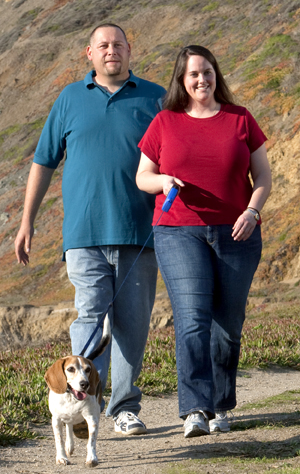Excess weight is a major risk factor for heart disease. Losing weight has many benefits including lowering your blood pressure, improving your cholesterol level, and decreasing your risk for diseases such as diabetes and heart disease. It may help keep your arteries open so that your heart can get the oxygen-rich blood it needs. All in all, losing weight makes you healthier and is one of the best ways to improve your heart's health.
Calories and weight loss
-
Calories are the fuel your body burns for energy. You get the calories you need from the food you eat. For healthy weight loss, women should eat at least 1,200 calories a day, men at least 1,500.
-
When you eat more calories than you need, your body stores the extra calories as fat. One pound of fat equals 3,500 calories.
-
To lose weight, try to reduce your total calorie intake. Talk with your healthcare provider to find a safe daily calorie level for weight loss. To reach it, you can eat fewer calories each day. Then add activity to burn the other calories. For instance, walking 2.5 miles burns about 250 calories. Other more intense activities can burn more calories in the time you spend doing them, such as swimming and running. It's important to understand that reducing calorie intake is much more effective for weight loss than exercise.
-
Eat a variety of healthy foods to get the nutrients you need while you're cutting your calories to reduce your weight.
Tips for losing weight
-
Drink 8 to 10 glasses of water a day.
-
Don’t skip meals. Instead, eat smaller portions.
-
Eat your meals earlier in the day.
-
Cut out sugary drinks such as soda and fruit juices.
-
Make your later meals lighter than your earlier meals.
Brisk activity is best
Brisk activity gets your heart pumping faster and makes it healthier. It’s also a great way to burn calories. In fact, your body may keep burning calories for hours after you stop a brisk activity:
-
Start by walking 10 minutes most days.
-
Add more time and speed to your walk. Build up as you feel able.
-
Each week, aim for at least 150 minutes of moderate-intensity aerobic activity, such as brisk walking. Or aim for 75 minutes of vigorous aerobic activity, such as swimming laps. This will help you get the most health benefits.
-
Get up and move more, and sit less. Sitting too much is linked with an increased risk of heart disease. Moving more and sitting less can help cut this risk.
-
The most important part of the activity is that you break a sweat. This means your heart's working hard enough to burn fat.



